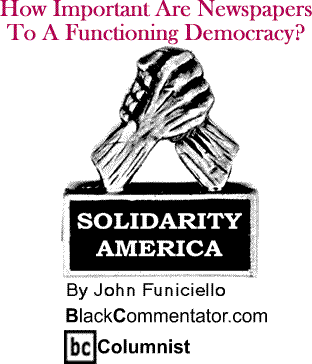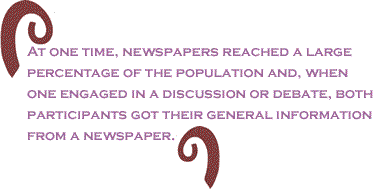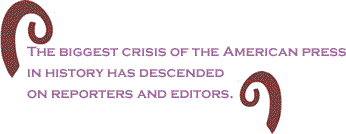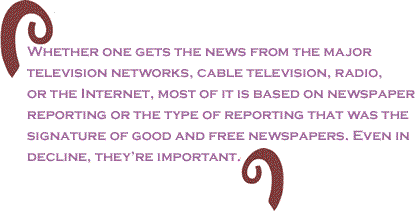
|
|||||||||||||||||||||||
 |
|

Custom Search
|
|
 |
|
While there are many and varied strong opinions about the state of the news business in America, it’s easy to miss what’s happening to the people who gather and report the news for newspapers, the historic foundation for the nation’s mass communications. Yes, there are television news shows (short and commercial-filled) and there are a few radio news operations (few, except for the diatribes of jocks who pretend that their rants have something to do with news). There are some fine news magazines and other periodicals, and books, but they reach only a small percentage of the people. Lately, there’s the Internet, but it’s so new and so untested that most people don’t know how to handle the information that is available. So, we’ll concentrate on newspapers, which present the news in a more or less reasonable manner. At one time, newspapers reached a large percentage of the population and, when one engaged in a discussion or debate, both participants got their general information from a newspaper. They had a starting point for debate. Reporters served a very important function in society for that reason, even though the power of assignment by the top editor and publisher had, and still has, great influence over what you read. Now, reporters are under siege, despite the very important function they have performed in society for generations. They’ve been downsized and short-staffed, they have been deprived of decent pay and benefits, and their corporate owners have bought and sold their papers as if they were crates of widgets. They’re workers, just like other workers in American industry. Many of them don’t see it that way, even those who work under a union contract. At the non-union papers—of which there are many—the reporters and editors are just as likely to identify with the publisher as they are with other wage workers. The biggest crisis of the American press in history has descended on reporters and editors. The reshuffling of ownership and the casting about of publishers and their corporate boards signal that newspapers as we knew them are coming to an end and the owners are panicking about the decline of readership and the disaster that follows: The decline in advertising revenues.
Mergers and consolidations of newspapers that have been under way in the U.S. for more than 40 years are nearly complete. What we get as news now comes from fewer outlets and the papers that come out of the boxes on the street corners contain less news each year, as newsprint and ink get more expensive and bean counters pressure newsrooms to cut staff and make room for more profit. What we’re seeing in America is no less than the creation of a much foggier perception of reality than we’ve ever had. There are now many thousands more news outlets and there are fewer checks and balances on the accuracy of what’s being disseminated. For example, on the Internet, the exceptions, at least in the view of an old newspaper reporter, are those whose accuracy, dependability, and reporting skills were honed on newspapers or magazines. They are people whose work was “peer reviewed” on a daily basis during a working life of 30 or 40 years. They’re people you can trust, but there are thousands of others out in cyberspace who have yet to prove themselves—many probably will but it will be over time. The Newspaper Guild, now affiliated with the Communications Workers of America, is in the grinder, its membership slipping along with the steady reduction or demise of daily newspapers, and the members themselves are suffering the same indignities that other workers suffer, as their companies are downsized or their work sent to other countries with a lower wage. A recent headline in the union’s national newspaper, The Guild Reporter, shouted, “No pause in death of a thousand cuts.” The story is about the loss of advertising income in the newspaper business, to the tune of $3 billion in the first six months of this year and the predictable response of the owners—cut staff and cut the news hole, the news space. People outside the newspaper business likely see the reporters in the same light as they do the owners. That’s a mistake. They’re workers and most of them still have something of the old ethic that says the paper is published to fulfill the intent of the framers of the Constitution when they wrote the First Amendment—that a free people need a truly free press to make a democratic republic work. After newspapers became “properties,” decades ago, there was a short battle of a few years’ duration, between the top reporters and editors and publishers and their corporate bosses about the reason they publish a newspaper: To bring the news of the day to the people without fear or favor, or to make money? The accounting department won that argument.
Unfortunately, the progress (or lack thereof) of organized labor in the U.S. has been greatly impeded by the philosophy honored by both sides, which says that the employer, the bosses, have “management rights,” which means that they can do what they wish with their enterprise, with no interference from the workers or their unions. Decades ago, there were those—especially in newspapers—who believed that the quality of the product should be a subject of bargaining. In news, after all, the stories that inform the people are often signed by the reporter, who must stand behind the information that’s printed. There was a clause in some union contracts, in fact, that addressed this “quality” issue. It said, in effect, if the story as submitted by the reporter was edited so as to change the meaning or intent of the reporter, said reporter could withhold the by-line. That was a “quality” issue, but negotiating for quality stopped there and that’s where we have run into trouble. Surely, newspaper owners would like to cut even more reporters and editors and have the work done in some other, cheaper, place. While it’s not likely that the news business will see much of its work being farmed out, it’s a possibility. For now, the corporate owners will be satisfied with slashing news and other staff, cutting that most costly of expenses, labor. The newspaper industry is diminished and so is the right of the people to be informed. It’s a quality issue. Whether one gets the news from the major television networks, cable television, radio, or the Internet, most of it is based on newspaper reporting or the type of reporting that was the signature of good and free newspapers. Even in decline, they’re important. And, even in decline, they provide the basis for a commonly-understood body of information, so there can be intelligent debate in the public square. Something else might eventually take the place of newspapers, but Americans still will require a common understanding of their daily lives. Otherwise, our “information age” will continue to take us toward a true Tower of Babel, in which no one will understand anyone else. That’s why it’s important to support the workers in the newspapers and, when “quality of the product” becomes an issue at the bargaining table, those workers will need even more support. When that time comes, when the people support the news workers in their quest to deliver accurate information and insights every day, there will be hope that the country’s direction will be turned and we’ll move toward being the free country that was envisioned so long ago. BlackCommentator.com Columnist John Funiciello is a labor organizer and former union organizer. His union work started when he became a local president of The Newspaper Guild in the early 1970s. He was a reporter for 14 years for newspapers in New York State. In addition to labor work, he is organizing family farmers as they struggle to stay on the land under enormous pressure from factory food producers and land developers. Click here to contact Mr. Funiciello. |
|
Any BlackCommentator.com article may be re-printed so long as it is re-printed in its entirety and full credit given to the author and www.BlackCommentator.com. If the re-print is on the Internet we additionally request a link back to the original piece on our Website. Your comments are always welcome. eMail re-print notice
If you send us an eMail message we may publish all or part of it, unless you tell us it is not for publication. You may also request that we withhold your name. Thank you very much for your readership. |
|
| |
|
| October 2, 2008 Issue 293 |
|
| Executive Editor: Bill Fletcher, Jr. |
| Managing Editor: Nancy Littlefield |
| Publisher: Peter Gamble |
| Est. April 5, 2002 |
Printer Friendly Version
in resizeable plain
text format or pdf
format. |
| Frequently Asked Questions |
 |

|
 |
 |
 |
| |
| |




































